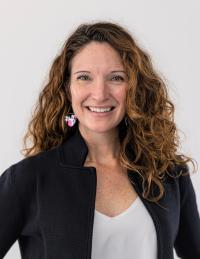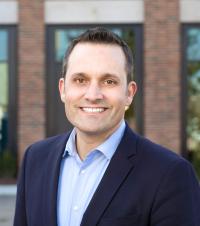Keynote Speaker: Lindsay Boyd
Collaborative Progress: Advancing Probation Services and Human Services Collaboration Through CQI to Improve Outcomes for the Joint Youth in Our Care
Discover the profound impact of bridging collaboration gaps between probation officers and human services professionals as we collectively strive for youth empowerment. Through real-world insights, keynote presenter and former probation officer Lindsay Boyd will shed light on how collaborative CQI efforts are pivotal in enhancing the quality of services for joint youth initiatives.
"Collaborative Progress" is not just a title; it's a call to action for a positive and impactful transformation in our shared mission. Join us on this thought-provoking journey as we delve into the heart of Continuous Quality Improvement (CQI) through the lens of collaboration, This exploration will help participants break from the silos and cultivate meaningful partnerships in the pursuit of a more effective and empowering environment for the youth we collectively serve.

Lindsay Boyd, MBA, MS, has 14 years’ experience as a senior deputy probation officer. She has worked a variety of probation assignments in both juvenile and adult divisions, including juvenile intake, electronic monitoring, corrections/custody, programming and juvenile placement, where she worked closely with the Human Services agencies in her county. Her passion for teaching led her to becoming one of the first Career Enhancement Academy instructors for her department. She also has experience instructing probation Core classes and several probation and leadership classes. Boyd is currently an instructor for UC Davis and a lead facilitator for the National and Curriculum and Training Institute, teaching both their criminal justice and Real Colors curriculum.
Keynote Speaker: Anita Barbee
How Both Values and Data Can Help Leaders Navigate Organizational Change in the Face of Workforce Challenges
The new millennium brought an escalation of global, national and local traumatic events in the form of the 9/11 terrorist attack, the wars in Iraq and Afghanistan, school shootings, mass murders, natural disasters due to climate change, several economic crises, civic unrest due to continued police brutality towards African Americans, and the Covid-19 pandemic. The impact of these numerous and cumulative traumas has impacted two generations of youth and young adults who now dominate the workforce. This presentation will tie these larger circumstances to the workforce challenges facing social service leaders today and will offer some key strategies leaders can enact as they seek to shift organizational culture and climate, monitor workforce trends within their organizations using data and CQI processes, and equip their organizations to respond to ensure better workforce outcomes including well-being, performance and retention.

Anita P. Barbee, Ph.D., MSSW, is Professor, Distinguished University Scholar and Ph.D. Program Director at the Kent School of Social Work and Family Science at the University of Louisville. She has worked in the field of child welfare for 32 years. In the past decade, she has worked intensively with California on the development and implementation of the California Core Practice Model. From 2016-2023, she was the lead evaluator on the Children's Bureau Quality Improvement Center for Workforce Development (QIC-WD), which conducted efficacy trials of workforce interventions in eight jurisdictions across the U.S. The team also worked with four of the original jurisdictions and two additional jurisdictions (including Ventura County) to strengthen recruiting efforts. Barbee has been a key contributor at several previous CQI Conferences. Please join us in welcoming her back!
Keynote Speaker: Vanessa V. Klodnick
Empathy, Alignment & Empowerment: The Secrets behind Effective CQI
CQI is emotional, relational, and deeply rooted in power dynamics. Without strategies to effectively navigate feelings, (dis)connections and power differentials, change can be incredibly painful and challenging. Drawing upon her real-world experience “facilitating” CQI in youth and young adult social service settings for over 18 years, Vanessa Klodnick will share her philosophy and approach to CQI and help you develop strategies to apply immediately to improve the CQI experience for all involved—and to achieve your organization's CQI vision. This dynamic keynote presentation will leave you feeling validated, empowered and confident in fostering stronger CQI collaboration.

Vanessa V. Klodnick, Ph.D., LCSW, is a nationally recognized implementation scientist in youth and young adult mental health. Klodnick empowers agencies across the US to implement continuous quality improvement practices to better understand, improve, sustain and grow innovative programs & practices. She leads/co-leads several federal, state, and foundation-funded mixed-methods studies, trains providers, and publishes widely in academic and practice literatures. Recently, she transitioned fully into a research scientist role at the Texas Institute for Excellence in Mental Health at UT-Austin after serving in program evaluation and research roles for 17 years in Thresholds Youth & Young Adult Services in Chicago.
Keynote Speaker: Barry E. Knight
"Hello, my name is___." – Unveiling the Faces and Stories Behind the Numbers
In this thought provoking session, Barry E. Knight will delve beyond statistical figures to illuminate the human narratives hidden within data. Focused on empowering leaders to use data and a systems thinking approach to guide discussions and decisions, the talk emphasizes that data are not mere numbers, but intricate reflections of individuals with a past, a present, and a future.
By urging a shift from numerical analysis to exploring histories, patterns, and beliefs, attendees will be inspired to perceive data as human stories, fostering a deeper understanding of the people they lead and serve, and enhance the 'quality' of continuous quality improvement.
This talk advocates for the disaggregation of data and encourages leaders to engage with the real people represented, elevating the interpretation of information to a more empathetic and comprehensive level.

Barry E. Knight is the founder and CEO of BEK Impact, a leadership consulting firm whose purpose is to coach and inspire executive leaders to drive greater impact and change by building a vision, leaders teams, and strategies that collectively improve engagement and outcomes for the people they lead and serve. Author of the book, The Gift Called Leadership: How the Leader's 'Presence' Empowers Others to Succeed, Knight also serves as Equity, Access, and Opportunity Officer for the County of Riverside. His work includes working with department leaders and analysts to identify and implement solutions to eliminate barriers and disparity for vulnerable and underserved communities, and to improve the quality of life for the people they serve. Knight is also a board member for the Corona Chamber of Commerce (CA), where he has served for 3 years and chairs the building expansion committee.
Keynote Speakers: Scott Modell and Kelly Knutson
Safety Science: Moving Away from Blame toward a Learning Culture
When critical incidents occur, the common response is to use reactionary approaches such as firing employees, writing new policies or retraining staff. These approaches have poor results when it comes to making systems safer. In fact, evidence suggests reactionary approaches can make agencies even less safe because true accounts of how the system operates and how it can be improved are kept underground.
Contemporary safety science approaches—championed by safety-critical industries such as aviation, healthcare and nuclear power—engage employees in safety-related efforts and establish comprehensive approaches to analyzing adverse events and promptly acting upon identified areas of improvement. This presentation will engage participants in a discussion on how agencies can evolve from outdated models of safety to embrace contemporary approaches that create safer systems and establish a safety culture.

Scott J. Modell, Ph.D., is the chief executive officer of MCG Consulting and the co-founder of Collaborative Safety. From 2013 to 2016, he served as the deputy commissioner of the Tennessee Department of Children’s Services. He has also served as the deputy commissioner of the Tennessee Department of Intellectual and Developmental Disabilities. Previously, Modell spent fifteen years as a professor at California State University, Sacramento. Over his last five years at the university, he additionally served as director of the university’s Autism Center for Excellence. He is an expert in child abuse, crime victims with disabilities, disability etiology and interview techniques. Having conducted workshops and trainings reaching thousands of police officers, educators, child protective service and adult protective service professionals across the country, Modell and his colleagues were referred to as pioneers in safety science by the Federal Commission to Eliminate Child Abuse and Neglect Fatalities. He has also received international recognition for his work in the area of crime victims and interview techniques for individuals with disabilities.

Kelly Knutson, M.S.W., M.Sc., is a senior director with Collaborative Safety, LLC, where she supports agencies across the United States with the development and implementation of Human Factors and Systems Safety (Safety Science) into their systems of care. This includes working with a variety of health and human service systems such as Child Welfare, Behavioral Health, Disability Services, Licensing, Health Regulation, and Human Resources. Her graduate work at Lund University in the Master’s Degree program in Human Factors and Systems Safety has set the foundation for this work. Previously, Knutson served as the Continuous Quality Improvement (CQI) supervisor within Minnesota’s Department of Child Safety and Permanency Division, where she was instrumental in supporting the application of human factors and systems safety analysis with the department’s statewide continuous quality improvement efforts. In addition to her extensive experience within the child welfare field (including specialized training and efforts to support trauma-informed child welfare systems), Knutson has a range of experiences working within human services that include juvenile justice, chemical dependency and child and adult mental health.
